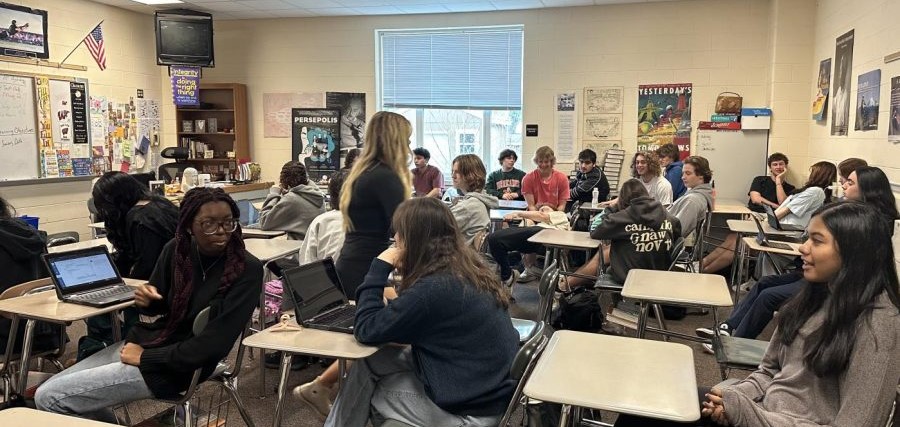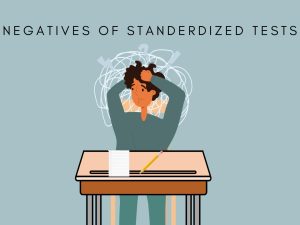Teacher supply: a local issue in desperate need of state attention
Students in a crowded AP Psychology class prepare for class to begin. Across the US, overcrowded classes are packed due to the nationwide teacher shortage.
April 10, 2023
In 2018, thousands across North Carolina rallied together to advocate for improved statewide public education. The march, organized by the North Carolina Association of Educators, also known as the NCAE, brought attention to the challenges faced by public school teachers. Teachers wore red in solidarity and united for one day to urge North Carolina legislators for increased school funding and pay.
Yet, despite the camaraderie and support felt from that one day in 2018, nearly five years later, North Carolina teacher vacancies have increased by 200 percent, and schools still continue to struggle to fill positions, leaving thousands of students without teachers and in crowded classrooms. State educators, politicians and advocates highlight how the lack of incentives and support to attract and retain teachers in North Carolina has significantly contributed to the ongoing teacher shortage, and while teacher supply is a localized challenge, it is desperate for the attention of the state.
Lance Atkinson is a teacher at Wakefield High School. As chair of the social studies department, he has experienced his fair share of struggles in hiring teachers, and more importantly, retaining teachers.
“I started hiring [teachers] in February 2022 [for the social studies department.] Just within the past month [I finished] hiring for the department,” Atkinson said. “It has been in and out that fast in terms of continuing to have to hire teachers, and then those teachers leaving.”
Tamika Walker Kelly has served as president of the NCAE since 2019 and notes that teachers of all ages and experience levels are choosing to leave the profession. She has also found that the nature of the profession is unappealing to college-aged students.
“We’re losing teachers who have been teaching for a long time. We’re also losing a lot of teachers who are beginning teachers to other professions that make more money. [And] in college, not enough students are choosing to become teachers,” Kelly said. “If you have a lot of people that are leaving, and not enough people that are coming in, we have a significant problem.”
According to data from the North Carolina School Superintendents’ Association, North Carolina’s public schools started the 2022-2023 school year with nearly 5,000 teacher vacancies; an underestimate of the true issue, as only 98 out of 115 school districts provided their data. This is in stark contrast to the roughly 1,800 vacancies from the 2019-2020 school year.
Atkinson highlights the immediate causes of statewide teacher vacancies.
“A lot of the people applying for teaching [positions] don’t necessarily have a teaching license. When you bring someone in that doesn’t have a teaching background, they’re more likely to leave the profession immediately, because they realize what it all entails,” Atkinson said.
However, the state’s teacher shortage can be alleviated by an increase in teacher salaries, which ultimately lies in the hands of the North Carolina General Assembly. North Carolina continues to offer some of the least-competitive teacher salaries in the United States. Our teachers earn on average 24.5 percent less than their North Carolina contemporaries in other professions, one of the largest gaps in the nation.
“It is a joint effort between the state and the local school district. It is up to the state to try to make teaching attractive to people. They set policies, they set the salaries and they set the standards of teaching to the department of public instruction,” Kelly said.
Kelly notes the lack of support from the North Carolina General Assembly regarding teacher supply in the state.
“I do not think that legislators in North Carolina take the teacher shortage seriously. It continues to show by the legislation that they pass or don’t pass,” Kelly said. “There is a lot more that can be done, but it does require our legislators to admit that they have a role in how that happens or does not happen.”
In recent estimates, North Carolina’s average teacher salary has fallen nearly 20 percent below the national average. Throughout her time in the North Carolina General Assembly, Representative Sarah Crawford has been an advocate for public schools and increased teacher pay. Rep. Crawford highlights the power the legislature has regarding teacher pay.
“We did see in the last biennial budget [that] there was an increase in teaching pay,” Rep. Crawford said. “It was not enough.”
Rep. Crawford notes how the political party in power determines teacher salaries and necessary funding.
“The legislature holds a lot of funding power; it’s the body that does the budget and controls the superstrings and it’s really the party in power that does the majority of that controlling,” Rep. Crawford said. “Right now, we do have a Republican-controlled legislature in both the House and the Senate, and the priority of this legislature has been much more focussed on supporting corporations than supporting people.”
However, Atkinson notes that not all of the power regarding teacher supply lies in the hands of the state.
“I think it boils down more to the county level [in terms of retaining teachers.] Wake County has the highest supplement pay in the state for teachers, which is an attraction, however, the attraction that Wake County has [always] relied on is not what’s bringing in teachers today,” Atkinson said. “Nowadays I think it relies more on the individual schools, the leaders of that school, and the environment that is being created.”
Jodi Riedel is a former Wakefield High School horticulture teacher and current professor at North Carolina State University. She can attest that school environment is a significant factor in a teacher’s choice determining to leave education.
“The best way to ensure teachers stay in education is to give them the latitude to make decisions that they feel are right for their students,” said Riedel.
Adding responsibilities to over-stretched and underpaid teachers has only exacerbated the trek to fill vacancies. Riedel also finds that students play a big factor in ensuring that teachers stay in the profession.
“Often [students] put teachers on this pedestal that they’re not human and that they aren’t going through their own personal [troubles.] Sometimes that is lost in translation when you’re in high school [because] you’re at a stage in your life when you’re thinking a lot about [yourself,]” Riedel said. “[Students] need to step back and realize that we’re all human, we all have critical flaws, and at the end of the day, we all have to support one another.”
Support between administration, faculty and students can come in various forms. Rep. Crawford notes that the state needs to make improvements in order to address the mental health concerns of students.
“We need to create an environment where teachers can teach. [This means] that we’re providing the mental health support in schools that our kids really need,” Rep. Crawford said. “We have students from elementary to high school that are really in mental health crises and it’s because we’re not paying for the social workers, school psychologists, school nurses and even physical health providers. Teachers are having to step in and fulfill that role and that distracts from their teaching time.”
In addition to creating both a comfortable working environment and learning environment, Rep. Crawford highlights the importance of supporting initiatives that may inspire, retain and motivate prospective teachers.
“We need to [advocate for] scholarship programs or student loan forgiveness programs that support our teachers,” Rep. Crawford said. “We need to put other incentives in place that really allow teachers to offset the cost of [living.] We cannot have teachers dipping into their own pockets to buy basic school supplies that their classrooms need, and that’s something that’s happening because the budget doesn’t allow for that.”
However, at the rate in which teacher vacancies are increasing in North Carolina, a solution is needed soon.
Cynthia Terrell has been a healthful living teacher at Wakefield High School for 20 years. Throughout her tenure, she has remained an active member of the PENC, Professional Educators of North Carolina, which promotes teachers’ voices and remains state-based. Terrell acknowledges her unease with the skyrocketing teacher shortage.
“I’m concerned that if something is not done soon, we are going to get subpar educators and not give the kids the quality of education they deserve,” Terell said.
This is a growing concern as North Carolina becomes increasingly desperate for teachers that the state has begun hiring through lateral entry: people who have an interest in teaching but don’t necessarily have a content or curriculum background.
Terrell highlights the crucial role the public plays in supporting education in North Carolina.
“If people are concerned about public education and wanting kids to be the best they can be, people need to start listening and [legislators] have to pay teachers [more] for all they do,” Terrell said. “Respect the profession, respect us as teachers [and] respect us as people. We are here to make sure [every] child has the best quality education they need.”










